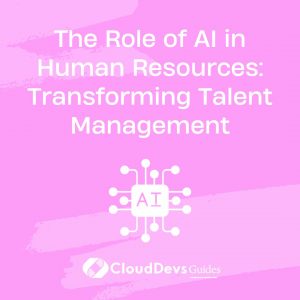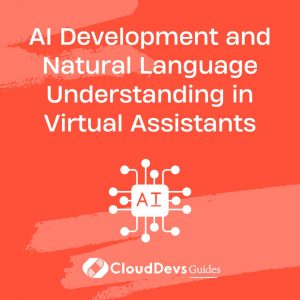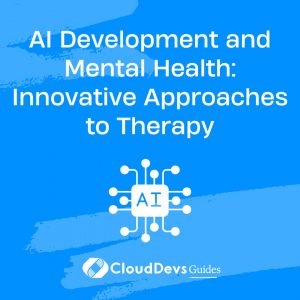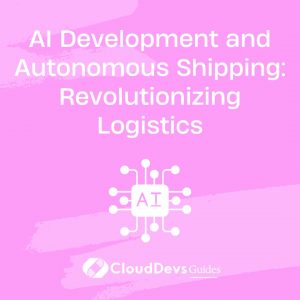The Role of AI in Human Resources: Transforming Talent Management
In today’s fast-paced and ever-evolving business landscape, the integration of technology has become essential for companies to remain competitive. Among the many technological advancements, Artificial Intelligence (AI) has emerged as a game-changer in various industries, and Human Resources (HR) is no exception. The infusion of AI into HR processes has revolutionized talent management, enhancing efficiency, accuracy, and decision-making. This blog explores the transformative impact of AI on talent management, delving into key trends, benefits, challenges, and real-world applications.
1. Understanding AI in Talent Management
1.1. Defining AI in HR
Artificial Intelligence refers to the simulation of human intelligence processes by machines, particularly computer systems. In the context of HR, AI encompasses the use of algorithms and data-driven technologies to automate, streamline, and enhance various aspects of talent management.
1.2. The AI-Powered Talent Lifecycle
AI’s influence on talent management can be observed throughout the employee lifecycle:
1.2.1. Recruitment and Sourcing
AI-powered algorithms can scan through resumes, identify suitable candidates based on specific job descriptions, and even conduct initial screenings. This significantly reduces the time and effort spent on manual resume screening.
Code Sample:
python
def find_matching_candidates(job_description, resumes):
suitable_candidates = []
for resume in resumes:
if ai_matching_algorithm(job_description, resume):
suitable_candidates.append(resume)
return suitable_candidates
1.2.2. Candidate Assessment
AI-driven tools can evaluate candidates through various assessments, such as video interviews or cognitive tests, providing more objective insights into their skills and potential cultural fit.
Code Sample:
python
def conduct_video_interview(candidate):
interview_analysis = ai_video_analysis(candidate.video)
return interview_analysis
1.2.3. Onboarding and Training
AI can personalize onboarding processes by analyzing new employees’ learning styles and tailoring training content accordingly. Chatbots can also assist in answering common employee queries during the onboarding phase.
Code Sample:
python
def personalize_training(employee_profile):
preferred_learning_style = ai_analysis(employee_profile)
training_content = select_training_material(preferred_learning_style)
return training_content
1.2.4. Performance Management
AI-enabled tools can monitor employee performance, providing real-time feedback and performance insights to both employees and managers. This data-driven approach enhances transparency and accountability.
Code Sample:
python
def analyze_performance(employee_data):
performance_insights = ai_performance_analysis(employee_data)
return performance_insights
1.2.5. Employee Engagement and Retention
AI-driven surveys and sentiment analysis tools help gauge employee satisfaction and engagement levels, enabling HR teams to take proactive measures to improve the work environment.
Code Sample:
python
def measure_employee_sentiment(surveys):
sentiment_scores = ai_sentiment_analysis(surveys)
return sentiment_scores
2. Key Trends Shaping AI in HR
2.1. Predictive Analytics
AI’s predictive capabilities are transforming HR from a reactive to a proactive function. By analyzing historical data, AI can forecast trends related to turnover, performance, and even identify high-potential employees.
2.2. Chatbots and Virtual Assistants
Chatbots powered by AI provide employees with instant answers to HR-related queries, enhancing user experience and freeing up HR professionals’ time for more strategic tasks.
2.3. Diversity and Inclusion
AI can help mitigate bias in hiring and performance assessments by focusing on objective data points rather than subjective criteria, thus promoting diversity and inclusion within the workforce.
3. Benefits of AI in Talent Management
3.1. Enhanced Efficiency
AI automates time-consuming tasks such as resume screening, allowing HR professionals to focus on high-value activities like strategic decision-making and employee development.
3.2. Data-Driven Insights
AI gathers and analyzes vast amounts of data, providing valuable insights into employee performance, engagement, and the effectiveness of HR initiatives. This data-driven approach enables informed decision-making.
3.3. Improved Candidate Matching
AI algorithms can assess candidate profiles against job requirements with precision, leading to more accurate and successful hiring decisions.
3.4. Personalized Development
AI tailors training and development programs to individual employees’ needs, fostering skill growth and career progression.
3.5. Enhanced Employee Experience
Chatbots and virtual assistants provide employees with quick responses to queries, improving overall satisfaction and engagement.
4. Challenges and Considerations
4.1. Data Privacy and Ethics
The use of AI in HR requires handling sensitive employee data. Ensuring data privacy and adhering to ethical guidelines is crucial to maintain trust and compliance.
4.2. Bias and Fairness
While AI aims to reduce bias, it can inadvertently perpetuate biases present in historical data. Regular monitoring and adjustments are necessary to ensure fair outcomes.
4.3. Human Touch
AI should complement, not replace, the human touch in HR processes. Certain aspects, such as emotional intelligence and complex problem-solving, remain inherently human.
5. Real-World Applications
5.1. IBM Watson Recruitment
IBM Watson uses AI to assist in recruitment by analyzing candidate resumes, identifying top matches, and even conducting preliminary interviews.
5.2. Unilever’s Digital Recruitment Assistant
Unilever’s AI-powered recruitment assistant engages with candidates, answering queries, and guiding them through the application process.
5.3. Pymetrics
Pymetrics employs neuroscience-based games and AI to assess candidates’ cognitive and emotional traits, aiding in unbiased candidate selection.
6. The Future of AI in HR: A Collaborative Approach
The role of AI in HR is poised to expand further as technology continues to evolve. However, the ideal approach is not full automation but collaboration. HR professionals will work alongside AI to make more informed decisions, enhance employee experiences, and drive organizational success.
Conclusion
In conclusion, AI is reshaping the landscape of talent management. From recruitment and onboarding to performance assessment and engagement, AI-driven tools are streamlining processes and delivering data-driven insights. As organizations embrace this transformation, it’s essential to navigate challenges responsibly and ensure that technology serves as an enabler rather than a replacement for human expertise. The future of HR lies in harnessing the power of AI to create a more efficient, inclusive, and engaging workplace for all.
Table of Contents









